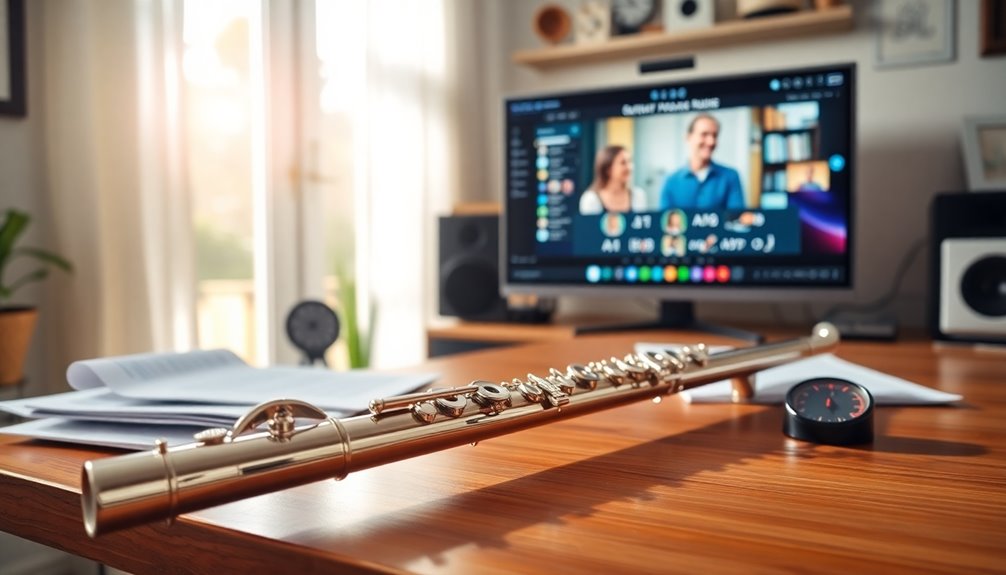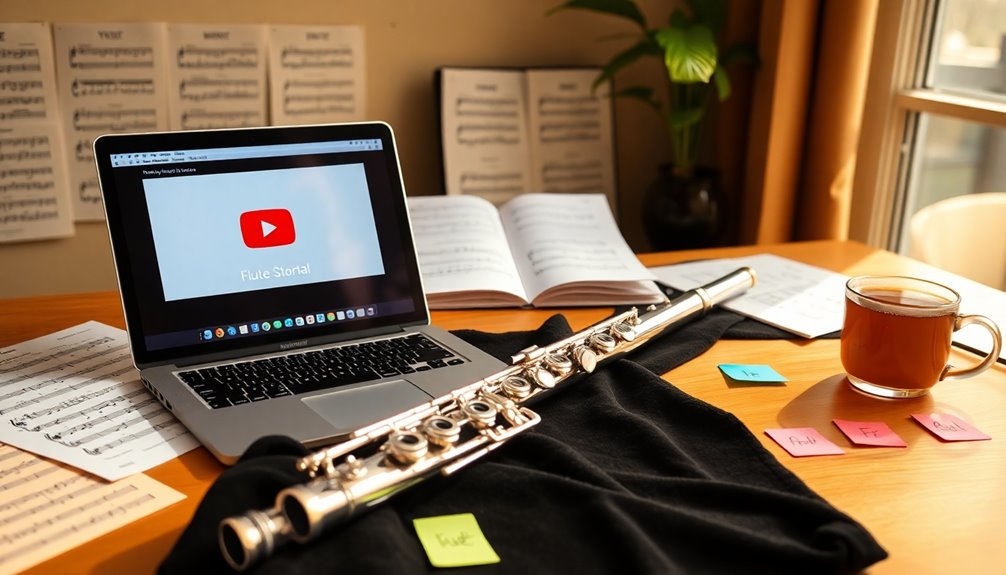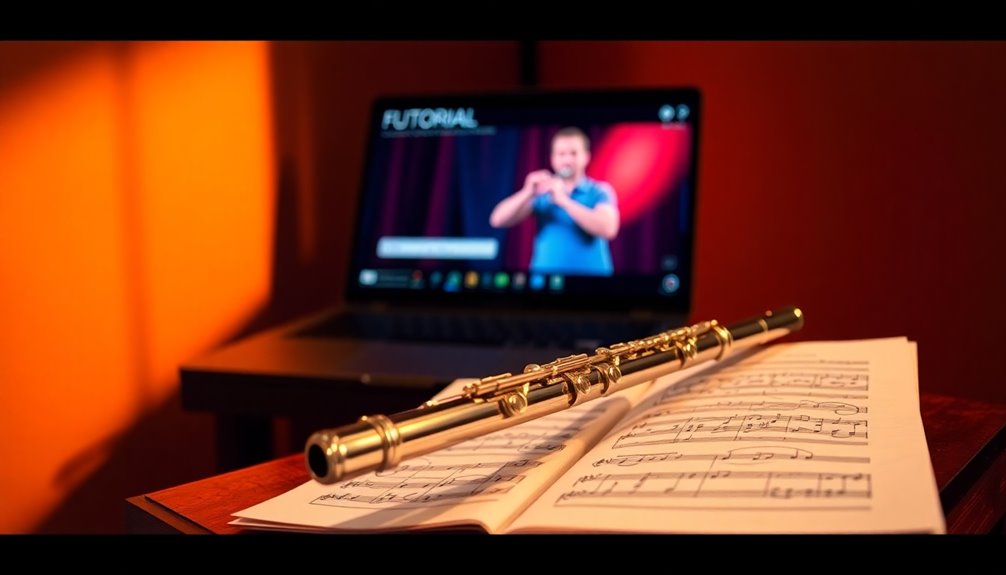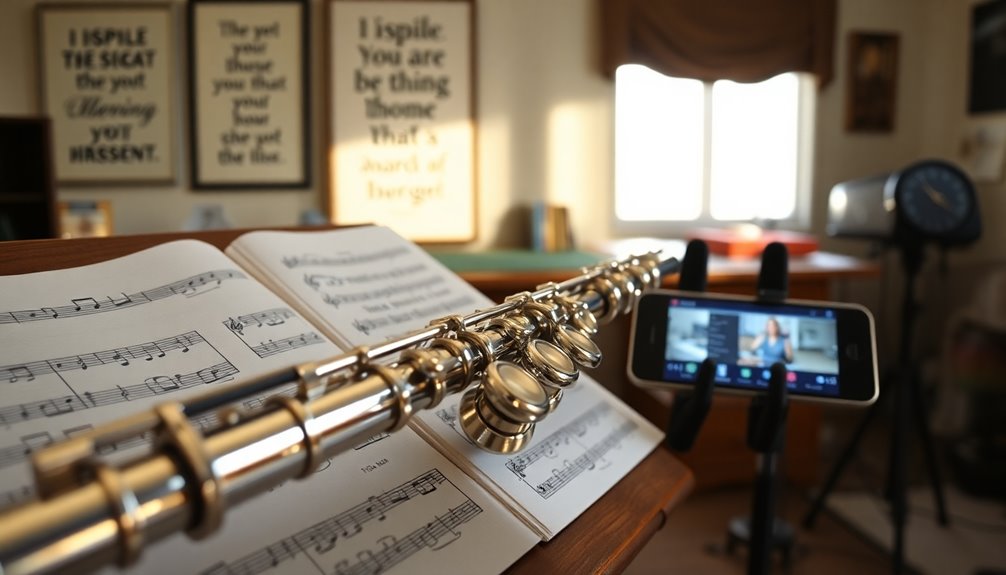You can kick off your flute-playing adventure today with fantastic online tutorials that suit every level. Start with beginner courses on platforms like Udemy or Skillshare, where you'll learn essential techniques and music theory. YouTube also offers channels focused on breath control, improvisation, and popular songs, making practice enjoyable. Consider skill improvement apps like Smart Flute to reinforce what you've learned. For free resources, explore sheet music on IMSLP or join online communities for support and motivation. The world of flute tutorials is vast, and there's so much more for you to discover and enhance your skills.
Key Takeaways
- Explore beginner-friendly online courses like "Flute Fundamentals" on Udemy to kickstart your flute journey.
- YouTube channels such as "The Flute Practice" offer free tutorials on essential techniques and improvisation.
- Join online flute communities for support, advice, and shared learning experiences with fellow beginners.
- Utilize apps like Yousician for interactive lessons and real-time feedback to enhance your skills.
- Access free sheet music and exercises from sites like IMSLP to practice at your own pace.
Understanding the Flute Basics

To get started with the flute, you'll want to familiarize yourself with its key components: the headjoint, body, and footjoint. Understanding flute anatomy is essential for effective sound production and overall playing technique. Each part plays an important role in creating the beautiful music you'll make.
The headjoint, the first piece you'll encounter, is where the magic begins. It houses the embouchure hole, which is significant for producing sound. When you blow across this hole, the air vibrates, and that's what creates your first notes. Experimenting with your embouchure—how you shape your lips—will help you find the sweet spot for a clear, resonant sound.
Next, the body of the flute contains the keys and tone holes that allow you to play different notes. Learning where each key is located will speed up your ability to navigate the instrument. Practice finger placement, as this will enhance your dexterity and make moving between notes smoother.
Finally, the footjoint adds a few more notes to your range, usually the lower pitches. It's the finishing touch that completes your flute and expands your musical capabilities. A good understanding of key mechanisms will also improve your technique and overall playing experience.
As you engage with the fundamentals of flute anatomy, remember that each component is interconnected, contributing to your sound production. By understanding these basics, you'll build a strong foundation for your flute journey.
Embrace the learning process, and soon, you'll feel right at home with your new instrument!
Top Online Flute Courses

With a solid grasp of flute anatomy, you're ready to explore the wealth of resources available to enhance your skills. Online learning platforms have transformed the way you can learn and master the flute. There are numerous courses tailored to different skill levels, ensuring you find the right fit for your needs. Whether you're a complete beginner or looking to refine advanced techniques, you'll discover courses that cater to your specific goals.
To help you navigate the options, here's a concise overview of some top online flute courses, along with brief flute course reviews:
| Course Name | Level | Platform |
|---|---|---|
| Flute Fundamentals | Beginner | Udemy |
| Advanced Flute Techniques | Intermediate | Skillshare |
| Mastering the Flute | Advanced | Coursera |
| Flute for All Ages | All Levels | YouTube (Various Channels) |
Each of these courses offers unique insights and instructional styles, ensuring you can find a course that resonates with you. As you explore these options, consider the course reviews which can provide valuable feedback from fellow learners. This sense of community is essential, as it keeps you motivated and engaged in your flute journey. Additionally, many tutorials offer structured lessons that promote systematic learning progression. Immerse yourself, make connections, and enjoy the process of becoming a skilled flutist!
YouTube Channels for Flute Learning

YouTube is a treasure trove for flute learners, offering a vast array of channels dedicated to honing your skills. Whether you're a beginner or looking to refine your technique, there's a channel that fits your needs.
Start by exploring channels that specialize in flute improvisation techniques. These tutorials not only teach you the basics but also encourage your creative side, helping you express yourself through music.
One channel to check out is "The Flute Practice," where you'll find engaging lessons on everything from breath control to advanced improvisation. The instructor often breaks down complex concepts, making them accessible and easy to understand.
You'll feel like you're part of a community as you learn alongside others who share your passion.
Don't forget to immerse yourself in channels that feature popular flute covers of songs you love. "Flute Channel" is a great option, showcasing a variety of genres. You can learn to play your favorite tunes while also picking up tips on phrasing and dynamics.
Plus, it's a fantastic way to connect with fellow flute enthusiasts who share your musical tastes.
Additionally, the flute's versatility allows you to explore different genres and styles, enhancing your learning experience.
Make sure to interact with the creators and other viewers in the comments section. Sharing your progress and asking questions fosters a sense of belonging and encourages you to keep pushing your boundaries.
Apps to Improve Your Skills

In today's digital age, numerous apps can considerably enhance your flute skills, making practice sessions more effective and enjoyable.
Whether you're just starting or looking to refine your technique, these tools can bring a sense of community and support to your learning journey.
One popular app is *Smart Flute*, which offers a thorough range of flute fingering charts. You can quickly reference finger positions for various notes, helping you build muscle memory and confidence as you play.
With its interactive features, you can even test your skills with quizzes to reinforce what you've learned.
For rhythm exercises, *Metronome Beats* is an essential tool. It helps you develop a strong sense of timing, which is vital for any musician.
You can set different tempos, practice complex rhythms, and even record yourself to track your progress. This won't only enhance your timing but also allow you to share your improvements with friends or fellow flutists.
Another great app is *Yousician*, which combines lessons with real-time feedback. You'll be guided through exercises and songs tailored to your skill level, making learning feel less intimidating and more like a fun game.
Plus, you can connect with a community of learners, sharing tips and celebrating each other's achievements. Additionally, these apps often feature customizable settings that help you optimize your practice sessions for enhanced progress.
Free Resources for Beginners

For those just starting out on their flute journey, a wealth of free resources is readily available online. You don't have to break the bank to access valuable materials that will help you learn and grow as a flutist.
First, check out websites like IMSLP or 8notes, where you can find free sheet music tailored for beginners. These platforms offer a variety of pieces ranging from classical to contemporary, giving you the chance to explore different styles and genres.
Additionally, many YouTube channels focus specifically on flute tutorials for beginners. These channels often provide step-by-step guidance on everything from basic finger placements to breath control techniques. Watching these videos can give you a sense of community, as you'll see others just like you taking their first steps with the flute.
To practice effectively, look for beginner exercises that help build your skills progressively. Websites like MusicNotes and FluteCompass often share free exercises aimed at developing your technique and sound production. Incorporating these exercises into your daily routine will strengthen your foundation and boost your confidence.
Don't hesitate to join online forums or social media groups dedicated to flute players. These communities offer support, tips, and encouragement from fellow beginners and experienced flutists alike. It's also helpful to explore different types of flutes for beginners, as understanding your instrument can greatly enhance your learning experience.
Intermediate and Advanced Tutorials

As you progress in your flute playing journey, exploring intermediate and advanced tutorials can elevate your skills to new heights. These resources are designed to challenge you while providing the support you need to master advanced techniques and refine your sound.
Start by focusing on specific areas where you want to improve. You might want to delve into advanced fingerings or explore the nuances of breath control. Many online tutorials offer step-by-step guidance, breaking down complex pieces into manageable sections, making it easier for you to grasp challenging concepts.
In addition to technical skills, performance strategies are essential at this stage. Look for tutorials that emphasize stage presence, emotional expression, and how to connect with your audience. Practicing these strategies won't only enhance your playing but also give you the confidence to perform in front of others.
Consider joining online communities where fellow flute players share their experiences and tips. Engaging with others who share your passion can be incredibly motivating and help you feel a sense of belonging.
Lastly, remember to regularly challenge yourself with new repertoires. Playing a variety of styles won't only expand your skills but also keep your practice sessions fresh and exciting. Exploring techniques like airflow control can significantly enhance your multiphonics and overall sound quality.
As you explore these intermediate and advanced tutorials, you'll find that the journey is just as rewarding as the destination. Happy playing!
Tips for Effective Practice

Effective practice is key to mastering the flute, and creating a structured routine can make all the difference. Start by setting specific, achievable goals for each practice session. Whether it's improving your tone, mastering a new piece, or perfecting a tricky passage, clear goals give your practice purpose and direction.
Next, establish consistent practice routines. Aim for shorter, focused sessions rather than long, unfocused ones. For example, practice for 30 minutes daily instead of cramming in two hours once a week.
Break your practice into segments: warm-up, technique, repertoire, and cool-down. This helps you stay organized and engaged while ensuring you cover essential areas.
Incorporate variety into your routines to keep things fresh and exciting. Alternate between scales, exercises, and pieces you enjoy. Challenge yourself with new material, but also revisit familiar pieces to reinforce your skills.
Remember, it's not just about playing; it's about understanding what you're playing. By focusing on breath control, you can enhance your tone production and overall sound quality.
Finally, don't forget to track your progress. Keep a practice journal to note what works, what doesn't, and where you need to focus next. Reflecting on your growth not only boosts your motivation but also builds a sense of community with your musical journey.
With clear goals, structured routines, and a little creativity, you'll find your practice sessions rewarding and effective. So grab your flute and start playing—your musical adventure awaits!
Joining Online Flute Communities

Joining online flute communities can greatly enhance your learning experience and provide valuable support. By connecting with fellow flutists, you'll find a sense of belonging that makes your musical journey more enjoyable. Whether you're a beginner or a seasoned player, these spaces are perfect for sharing tips, asking questions, and getting feedback.
Flute forums and social networking sites are fantastic places to connect with others. You can discover resources, share your progress, and even collaborate on projects. Here's a quick overview of what you might find in these communities:
| Type of Community | Benefits | Popular Platforms |
|---|---|---|
| Flute Forums | Ask questions, get advice | Flute Forum, Talk Classical |
| Social Networking | Share experiences, connect | Facebook Groups, Reddit |
| Video Tutorials | Visual learning, feedback | YouTube, Instagram |
Don't hesitate to plunge into discussions and introduce yourself! Many members are keen to help, and you'll likely find someone who shares your interests. Participate in challenges or group lessons to keep your motivation high. Additionally, exploring flute maintenance and cleaning techniques shared by community members can help you keep your instrument in top shape.
Frequently Asked Questions
What Age Is Appropriate to Start Learning the Flute?
When considering what age's appropriate for your child to start learning the flute, think about their musical readiness and child development.
Typically, kids around age 8 can handle the physical aspects of playing. However, each child's readiness varies.
Look for signs of interest and enthusiasm for music; that's a great indicator! Engaging them in music at an early age fosters their creativity and confidence, helping them feel a sense of belonging in the musical community.
Do I Need a Specific Type of Flute for Beginners?
Isn't it fascinating how the right beginner flute can make all the difference?
For beginners, a standard silver-plated flute is often recommended. These flutes offer a good balance of affordability and quality.
You might also consider closed-hole flutes, which are easier to play for those just starting out.
Exploring different flute types will help you find the perfect match for your musical journey, ensuring you feel confident and inspired as you learn.
Can I Learn Flute Without a Teacher?
Absolutely, you can learn the flute without a teacher!
With self-taught learning, you'll find plenty of online resources to guide you. Start by watching tutorial videos and following step-by-step lessons.
Join online forums or social media groups to connect with fellow learners. They'll offer support and tips as you progress.
Remember, practice is key, so stay dedicated, and you'll see improvement in no time.
Enjoy the journey of making music!
How Long Should I Practice Each Day?
Wondering how long you should practice each day? The answer might surprise you! Aim for at least 30 minutes in your daily routine.
Consistency is key; even short, focused sessions can yield big results over time. Break it into chunks if you need to, and don't forget to mix in fun pieces to keep your enthusiasm alive.
Soon enough, you'll feel your skills growing, and you'll be part of a vibrant musical community!
What Are Common Mistakes Beginners Make?
When starting out, you might encounter common mistakes like embouchure issues and poor breath control.
It's essential to maintain a relaxed yet firm embouchure, as tension can hinder your sound.
Also, focus on your breathing; shallow breaths won't give you the support you need.
Remember, everyone makes these mistakes, so don't be discouraged.
Embrace the learning process, and soon you'll find your confidence growing as you improve!
Conclusion
So, you've got all these amazing resources at your fingertips, yet you're still waiting for the perfect moment to start playing the flute? Isn't it ironic how the best time to pick it up is right now? With online courses, YouTube tutorials, and apps galore, there's no excuse to procrastinate. Jump in, experiment, and soon you'll be the one inspiring others. Remember, every great flutist was once just someone who decided to start playing today!






